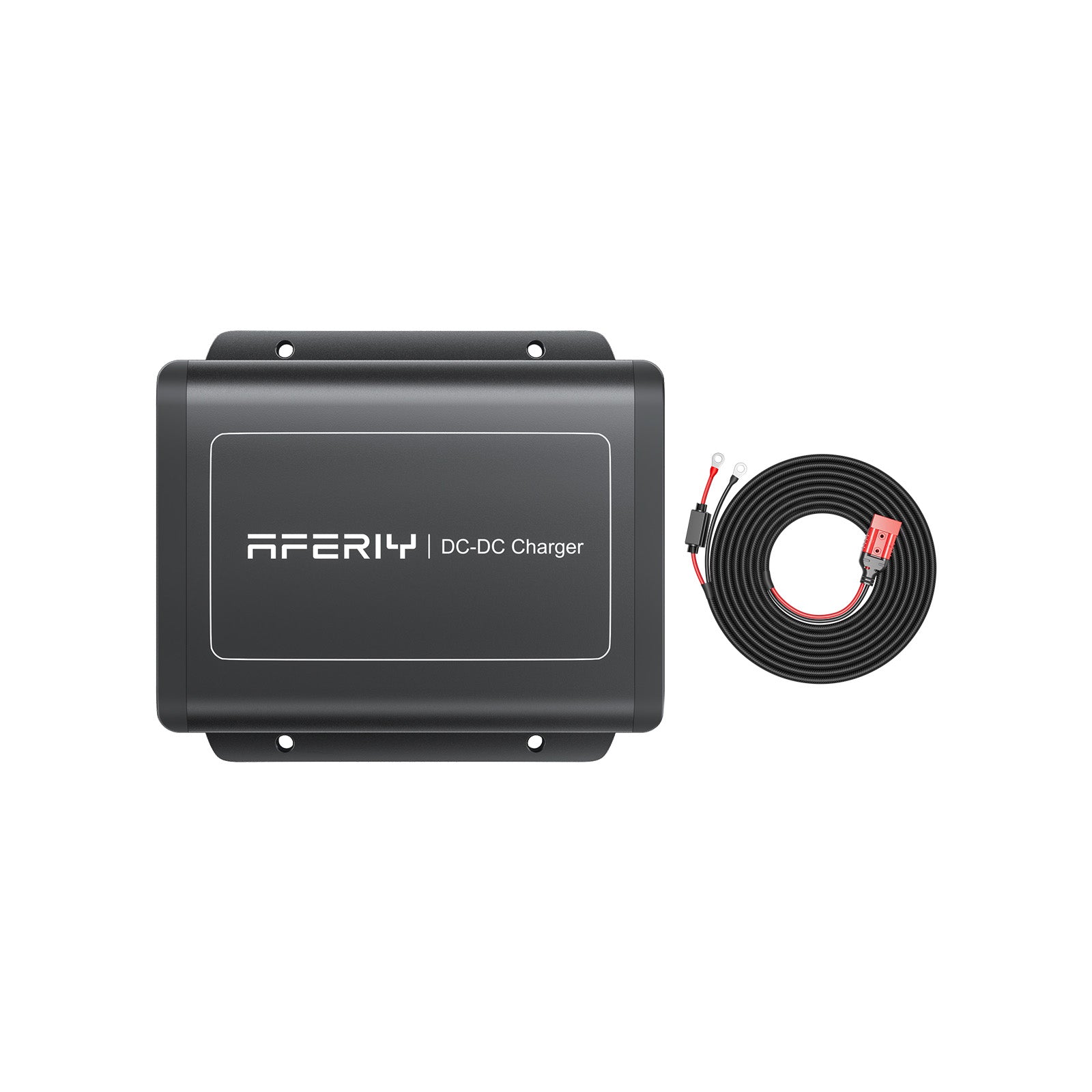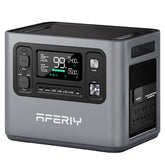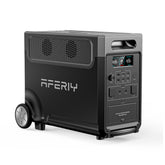As we all know, getting a continuous and reliable power supply in off-grid or outdoor settings for a long is a big problem. You can think of purchasing a large-capacity battery power station with an outlet to provide basic electric needs, such as a fan or a computer charger. However, what should you do if the battery runs out? Here is your ideal power solution -- solar power panels. These panels can turn sunlight into electricity and keep your appliance working.
More people and companies are choosing solar panels for their energy needs. The numbers are growing fast. Now, millions around the globe are going solar for a better, more eco-friendly future. This blog will aim to reveal everything about solar panels. whether you need any of those portable solar power panels or something bigger, the tips below can be of help.
What Is a Solar Panel?
A solar panel is a device that converts sunlight into electricity by using photovoltaic (PV) cells. PV cells are made of materials that produce excited electrons when exposed to light. The electrons flow through a circuit and produce direct current (DC) electricity, which can be used to power various devices or be stored in batteries. Solar panels are also known as solar cell panels, solar electric panels, or PV modules. (From Wikipedia)
You can link up multiple solar panels to a portable power station as a solar generator kit to give your appliances essential and sustainable power. They're perfect for camping, hiking, or when you can't access regular power sources.
How Do Solar Panels Work?
The entire process commences once the panels start gathering sunlight. The sunlight contains tiny particles called photons.
When photons hit the solar cells in the panel, they knock electrons loose. This creates electricity. Solar cells are mostly made of a material called silicon. They are treated to make sure they can grab and use these electrons to create an electric flow.
How the panels are set up matters a lot. They need to face the sun just right to catch as much light as possible. The better they can do this, the more electricity they make. Efficient panels are great at turning a lot of sunlight into electricity, making the whole setup more worth it.
Benefits of Solar Panels
There are now more and more households that are already generating their own power with solar energy as their home backup, and outdoor power supply. This clean energy source is making the electric grid more dependable and helping users save a lot of electric bills. With all of this interest and so much information available, we want to take a moment to highlight some benefits of solar panels:
Environmental Benefits
Solar panels are heroes for our planet. They grab sunlight and turn it into clean power. That means no nasty gases messing up our air. They're fighters against climate change, telling us it's high time we embraced solar energy. It's all about keeping Earth safe and sound for everyone, now and down the road.
Economic Benefits
Guess what? Solar panels can fatten up your wallet, too. Got them on your roof? Watch your electric bills shrink.
And here’s a kicker: you can actually earn some cash by sending the power you don’t use back to the electric company. Thanks to some cool programs, your extra juice isn’t just going back into the grid; it’s turning into money. Talking about a smart investment, solar panels are like planting money trees in your backyard.
Energy Independence and Resilience
Here’s another cool thing about solar panels: they cut the cord on your need for other energy types. You become your own power station. That’s a big deal because it means less leaning on oil, gas, or the grid that sometimes lets us down.
Imagine there’s a big storm and the power’s out everywhere. But not at your place. You’ve got the lights on and the fridge running, no sweat. That’s solar panels for you, making sure you’re always one step ahead. They're not just about saving the planet or saving money; they’re about taking control of your energy and making sure you’re set, come what may.
How much power does a solar panel produce?
Solar panel wattage is determined under laboratory conditions, but the actual output constantly changes depending on the type of photovoltaic (PV) solar panels you use and external factors like sunshine and ambient temperature.
But here is still a simple formula to calculate the power produced by solar panels for your reference.
Power = Watt * Hours * 0.85
For instance, the Aferiy AF-S200 200W Solar Panel can generate up to 200W or less power. If they receive the sun's peak rays for 5 hours, you can calculate the power using the formula:
Power = 200W * 5 * 0.85 = 850 Watts.
Remember, it is a simple calculation, and the actual power production will depend on the sunlight intensity and weather conditions.
Installing Solar Panels – Here are Factors to consider
When it comes to installing a solar panel, there are some factors that must be considered. These will be explained below for better understanding.
Location and Solar Potential
Start by checking how much sun your place gets. You need a lot of sunlight for a solar panel to work its best. Make sure nothing big, like trees or buildings, will block the sun. Shadows can make the panels less effective.
Roof Suitability
Then, take a look at your roof to see if it’s good for solar panels. The way your roof faces, its slant, and how strong it is are all important. Your roof should ideally look towards the south to get the most sun. It should also be at a good angle to catch sunlight well. Plus, make sure your roof is strong enough to hold the panels and can handle having them put on.
Local Regulations and Incentives
Don’t forget to check the rules in your area and what kind of help you can get. Some places have special permits for solar panels. There might also be money-saving deals like tax breaks or other bonuses that can make solar panels a better deal for you.
Financial Considerations
Think about the money part of getting solar panels. This includes the cost to start, how it pays off over time, and ways to pay for it. Yes, solar panels cost a lot at first. But, you’ll save money on your power bills later on. You might even make money if you send extra power back to the electric company. Look into solar loans or leases. These can help make the cost of solar panels easier to handle.
Choosing the Right Solar Panel Supplier
Choosing the right solar panel supplier is very important for your solar project. Look for suppliers who are well-known and have lots of experience. They should have done great work before. Make sure they offer good warranties. This means your solar panels are safe if something goes wrong. A good supplier will help you from the start until after your solar panels are working. They make sure everything goes smoothly as you switch to solar energy.
You don't need to worry excessively about product quality. Aferiy solar panels are designed for easy installation and user-friendly operation. Aferiy also have professional technicians who are readily available to assist you.
Maintenance and Care for Solar Panels
Keeping your solar panels working well and lasting a long time means you have to look after them. Doing this helps your solar energy system work its best and keeps your investment safe for many years.
Regular Maintenance Tasks
You should clean your solar panels regularly. Dirt, dust, and other things can block the sun. That’s not good. Cleaning them helps a lot.
Check how well your solar panels are working often. This lets you find problems early and fix them. Also, look for any damage like cracks or loose parts. Fixing these problems keeps your solar panels working right.
Troubleshooting Common Issues
Sometimes, things like trees or buildings might shade your solar panels. This means they get less sun and don't work as well.
Make sure your panels are clean. Dirt can stop them from getting enough sunlight. If there are problems with your equipment, like the inverter or wires, fix them fast. This keeps your solar system running smoothly.
Extending the Lifespan of Solar Panels
To make your solar panels last longer, they need to be put in right and taken care of. They should get as much sun as possible. Be careful when you’re cleaning or doing anything near them to avoid damage. If there's a problem, use your warranty. This helps you get it fixed for free by the manufacturer.
Conclusion: Embracing Solar Panels for a Sustainable Future
As we wrap up our talk about solar energy, remember how important solar panels are. They help us switch to clean energy that doesn't harm our planet. Solar panels use the sun's power. This helps us lower pollution and fight against climate change. Think about using solar energy for your house or business. Going solar is good for the Earth. Plus, it saves you money in the long run and makes you less dependent on other energy sources. Let's all move towards a cleaner future. Think about getting solar panels today.
Frequently Asked Questions
How much does a solar panel cost?
Solar panel prices vary. They depend on size, brand, and watts. Usually, the watts of solar panels are bigger, more expensive, and more capable of meeting your electricity needs. Remember, if you want to expand a battery to store the power, it will cost more. Comparing quotes from different companies is a wiser way that wouldn't break your budget. Here is a quote from Aferiy for your reference.
Please note that the price here is only a reference, please consult the merchant for the actual price.
Are portable solar panels effective?
Yes, for some uses. Portable solar panels are smaller and weaker than rooftop ones. They're great for camping or charging devices. But they might not power a whole house. Think about your energy needs and the panel's power before buying.
How do you maintain and clean solar panels?
It's simple. Regularly check for and clean off dirt or leaves. Use a soft brush, mild soap, and water. Don't use harsh tools or cleaners. Also, make sure wires and connections are in good shape. If unsure, ask a professional.
Do solar panels work on cloudy days?
Solar panels work on cloudy days but produce less power. Clouds block some sunlight. Yet, modern panels still capture some light, providing electricity even when it's not sunny.
Do solar panels work at night?
No, solar panels need sunlight. At night, you can use electricity stored in batteries or supplied by the grid. This way, you have power even without sunlight.
































